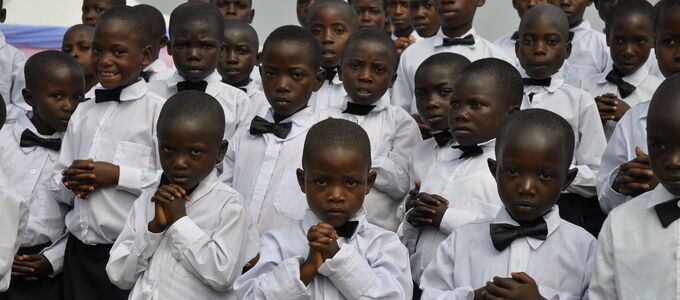Great achievements in one of the smallest African countries

A unique flora and fauna, a pioneer in environmental protection, and strong economic growth. Rwanda is one of the smallest countries in Africa but is setting standards for innovation and prosperity. Chief Apostle Jean-Luc Schneider will conduct two divine services there this coming weekend.
The Chief Apostle should pack his suitcase carefully. When you enter Rwanda, all plastic bags are confiscated at the airport. In Rwanda there is a nationwide ban on plastic bags in effect. Shampoo bottles that are not entirely leak-proof should better be wrapped in paper bags. And so should any sandwiches for the long flight. The country is a pioneer in environmental protection. “One of the cleanest countries in the world,” Apostle Joseph Serubibi Tuyisabe says. He is the Apostle who is responsible for New Apostolic Christians in the country. Waste separation is required by law in Rwanda and anyone who dumps waste in public spaces can expect a hefty fine upwards of the equivalent of 60 US dollars or a prison sentence. Public spaces in the country are therefore largely free of waste, and energy is generated by hydroelectric power plants and with the help of modern technology, by which natural gas is pumped from under Rwanda’s largest lake, Lake Kivu.
The people of Rwanda are also proud to have the world’s highest percentage of female members of parliament: “More than 60 per cent of the members of parliament are women,” the Apostle relates.
Through the highs and lows of history
“Since 2000, Rwanda has been one of the five most developed countries in Africa,” the Apostle reports. “It has one of the most developed internet connections in Africa.” And this despite the fact that the country, which is landlocked and lies between Burundi, Uganda, Tanzania, and the Democratic Republic of the Congo, was long one of the poorest in Africa. It is one of the most densely populated countries in Africa and conflicts contributed to an unfavourable economic situation.
One of the worst conflicts was that between the Hutu and Tutsi ethnic groups. European colonial powers, in this case Germany and Belgium, and their concepts of race divided the two groups. The Hutu, who are traditionally farmers, and the Tutsi, who are traditionally cattle breeders, are ethnic groups that have long lived together on East African territory, shared a language, and also intermarried. Occasional conflicts over the land were intensified by the colonial powers.
In 1959 there was a Hutu uprising against the Tutsi rule established by the former colonial powers, which claimed around 100,000 lives. Some 150,000 Tutsi were displaced and forced to flee to Burundi and Uganda. Even after independence in 1962, the conflicts continued, culminating in a civil war in 1990 and the genocide of the Tutsi in 1994. According to official statistics, 1,074,017 Tutsi and Hutu who did not want to take part in the massacres were killed.
Rwanda has moved on, economically, socially, and politically. “Although this was a tragic event in history, it was also a turning point in the history of the country,” the Apostle says. “Since then, the country has embarked on the path to a new social, economic, and ecological development that is supported by the reconciliation of all Rwandans.”
How Christianity came to Rwanda
The first missionaries around 1900 did not have a hard time convincing the population to embrace Christianity. The indigenous religious cult is a monotheistic cult with Imana, the creator god, and Ryangombe, the earthly representative of God. The parallels to Christianity can hardly be overlooked. Today, over 50 per cent of the population is Roman Catholic and almost 40 per cent Protestant.
Apostle Edward Deppner from Canada, who supported District Apostle Michael Kraus with missionary work, noted that Rwanda was one of the most densely populated areas in Africa. In 1976, together with Evangelist Fred Sharpe, he made the first mission trip there. From the mid 1980s, his son Stephen Deppner was also responsible for Rwanda. And when his brother, the current District Apostle Michael Deppner, studied medicine in Burundi, he was often in neighbouring Rwanda help build up the New Apostolic Church there. Construction of the first churches began as early as 1983.
A big event: the visit of the Chief Apostle
Today, the New Apostolic Church has almost 43,000 members, who are served by 485 ministers in 135 congregations. They are excited at having the Chief Apostle visit them. On Friday, 19 January, a divine service will be held at the Umuganda Stadium in Gisenyi, a picturesque little town on Lake Kivu. A second divine service will take place on 21 January in a hall in Kibungo. This is near the capital Kigali and the brothers and sisters from the districts of Kirehe, Kigali, and Byumba are invited.
Photo: NAC Canada




